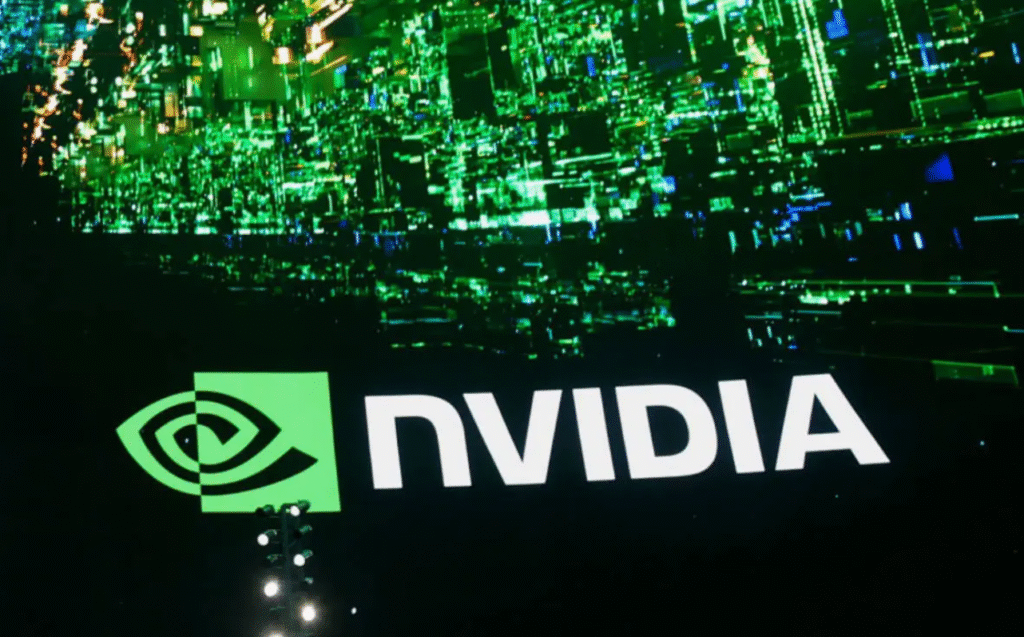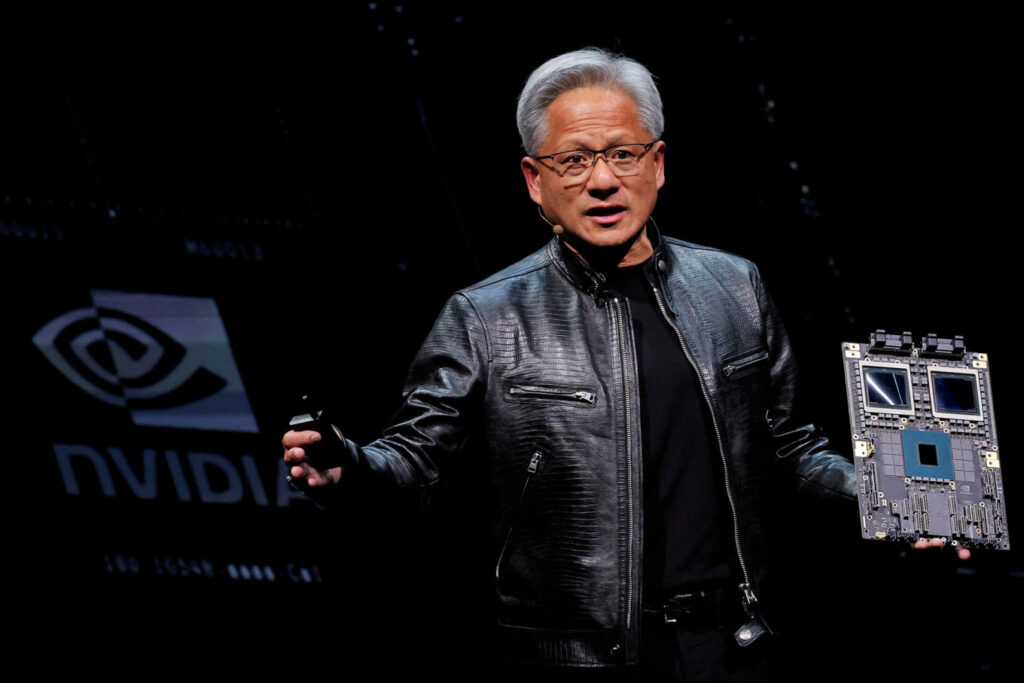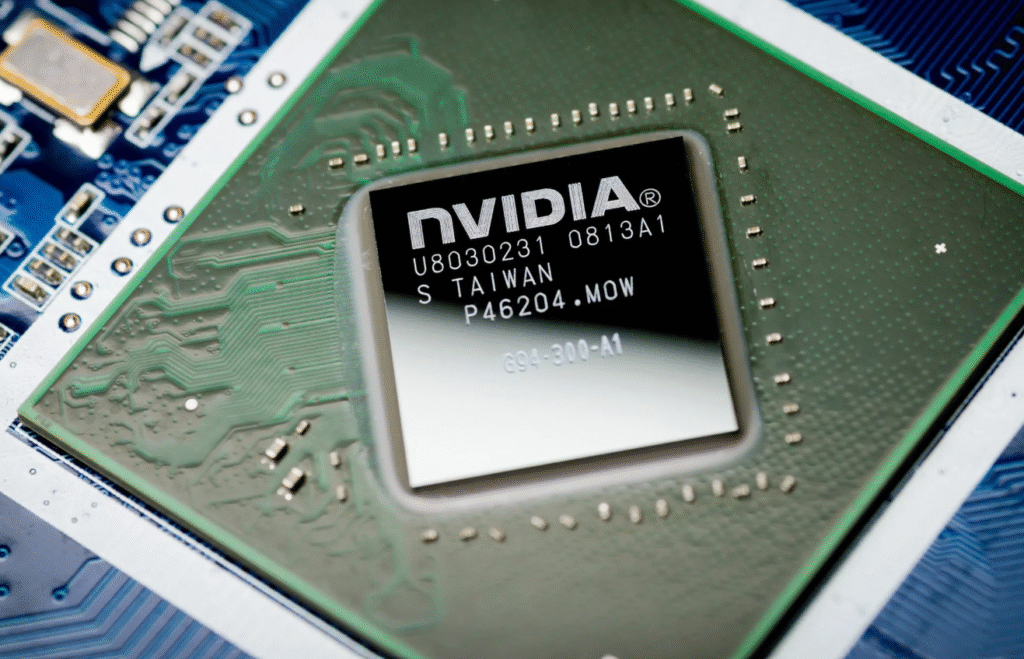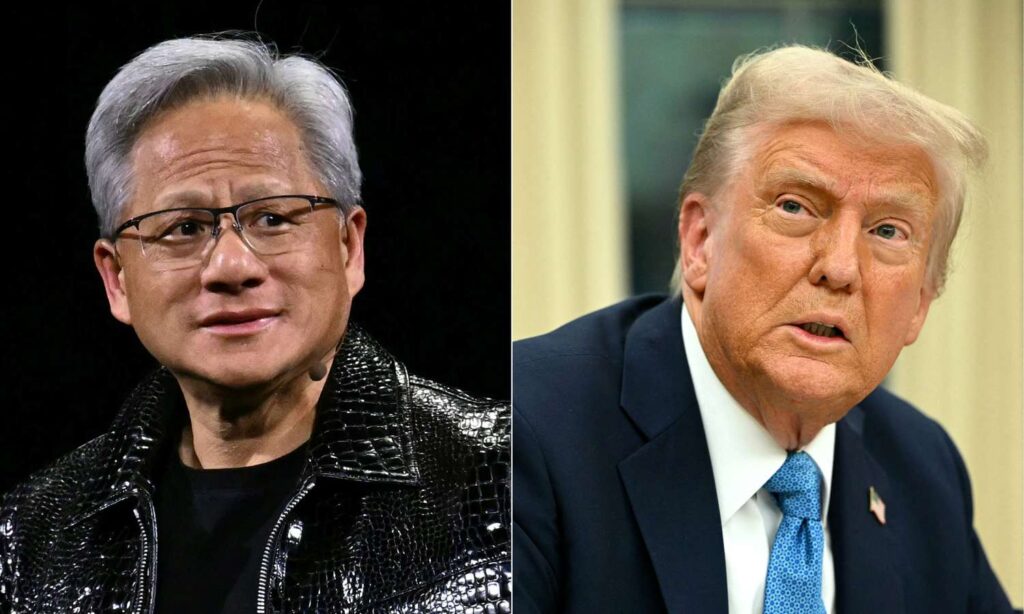Nvidia to resume sales of its H20 AI chips in China after Trump administration assures export license approval. CEO Jensen Huang confirms shipments to begin soon.
In a significant shift that could reshape the global AI chip landscape, U.S. semiconductor giant Nvidia has announced it will resume sales of its H20 artificial intelligence chips to China. This development comes after the Trump administration assured the company that it would be granted export licenses, easing previously firm restrictions. The move follows a high-level meeting between Nvidia CEO Jensen Huang and President Donald Trump, underlining the strategic importance of U.S.-China tech relations.

A Breakthrough After Regulatory Roadblocks
Nvidia, headquartered in California, is renowned for producing some of the most advanced AI processing units in the world. However, recent U.S. export controls have prevented the company from selling its top-tier chips to China. These restrictions were rooted in concerns that cutting-edge semiconductors could be repurposed by Beijing to bolster its military capabilities.
To comply with the new rules while still tapping into China’s massive AI market, Nvidia developed the H20 chip — a less powerful version of its flagship AI GPUs, tailored specifically for Chinese clients. Despite this strategic adjustment, sales were halted when the Trump administration tightened licensing requirements in April 2025, casting doubt on the future of it’s China business.
But now, the tides have turned. Nvidia revealed on Tuesday that it is filing new applications to sell the H20 GPU, backed by fresh assurances from Washington that licenses will indeed be approved.
CEO Jensen Huang Confirms Resumption Plans
In a statement, Nvidia said, “The US government has assured Nvidia that licences will be granted, and Nvidia hopes to start deliveries soon.”
Adding a personal touch to the announcement, Nvidia CEO Jensen Huang appeared in a video aired by Chinese state broadcaster CCTV. Clad in his trademark black leather jacket, Huang expressed his optimism:
“The US government has approved for us [to file] licences to start shipping H20s, and so we will start to sell H20s to the Chinese market. I’m looking forward to shipping H20s very soon, and so I’m very happy with that very, very good news.”

Huang’s remarks were made during a media interaction, where he appeared upbeat and excited about re-entering the Chinese market.
The US government has approved filing licenses to start shipping H20s, and NVIDIA will start to sell the H20s to the Chinese market, NVIDIA CEO Jensen Huang said on Tuesday. (Video: CCTV) pic.twitter.com/siRT0VLXyv
— Global Times (@globaltimesnews) July 15, 2025
Economic and Strategic Impact
Zhang Guobin, founder of the Chinese tech news platform eetrend.com, emphasized the significance of the move, calling it a substantial revenue opportunity for Nvidia. “The resumption will bring Nvidia substantial revenue growth, making up for the losses caused by the previous ban,” he said.
Zhang also noted that the decision could help ease the strain on global semiconductor supply chains, which have been severely affected by U.S.-China trade tensions. However, he warned that uncertainty lingers:
“The Trump administration has been… prone to abrupt policy shifts, making it difficult to gauge how long such an opening might endure.”
Indeed, while the current window provides Nvidia with renewed access to a critical market, future policy changes could alter the landscape once again.

This announcement comes just ahead of Huang’s scheduled appearance at a major supply chain conference in China, marking his third visit to the country in 2025. According to CCTV, Huang has increasingly demonstrated a commitment to maintaining and deepening Nvidia’s presence in the Chinese tech ecosystem.
Earlier in April, Huang met Chinese Vice Premier He Lifeng in Beijing, where he expressed optimism about China’s economic prospects and reiterated Nvidia’s intention to invest further in the country.
He told Xinhua, the official state news agency, that he was “willing to continue to plough deeply into the Chinese market and play a positive role in promoting US-China trade cooperation.”
The Export Control Saga
The U.S. government’s decision to restrict AI chip exports stemmed from rising concerns over the potential militarization of artificial intelligence in China. Chips like Nvidia’s A100 and H100, which are used in advanced AI model training, were previously banned from sale to Chinese firms.
To navigate the restrictions, Nvidia designed the H20, along with the L20 and L2 chips, to meet regulatory requirements while still offering competitive AI processing power. However, even these chips faced new licensing rules this year, leading to a halt in sales.

This reversal from the Trump administration indicates a potential recalibration of U.S. tech policy amid growing pressure from the semiconductor industry, which has been lobbying for greater access to overseas markets.
Huawei and Local Competition
While Nvidia regains access, the delay in sales allowed domestic Chinese companies like Huawei to close the gap. Huawei has been making notable progress in AI chip development, and restrictions on U.S. chipmakers have only accelerated Beijing’s push for tech self-reliance.
Despite this, Nvidia’s brand recognition, superior software stack (including CUDA), and global partnerships give it a solid footing, even in a competitive and politically sensitive market like China.
US-China Trade Relations
The resumption of Nvidia’s H20 chip sales also reflects broader dynamics in U.S.-China relations. As President Xi Jinping doubles down on economic self-reliance amid external pressures, American companies face a delicate balancing act: complying with domestic regulations while staying engaged in one of the world’s largest consumer markets.

China’s economy grew 5.2% in the second quarter of 2025, outpacing analyst expectations. Despite internal challenges such as weak consumer sentiment and a prolonged property sector crisis, the resilience of the Chinese economy provides tech firms with strong incentives to maintain a local presence.
Possible R&D Expansion in Shanghai
Adding to the intrigue, the Financial Times reported in May that Nvidia plans to establish a new research and development center in Shanghai. While neither Nvidia nor local officials confirmed the report, such a move would signal the company’s long-term interest in anchoring its innovation ecosystem closer to one of its key markets.
Nvidia’s return to the Chinese market with its H20 chips is not just a business decision — it’s a carefully negotiated re-entry into one of the most geopolitically sensitive arenas of the global tech industry. Backed by diplomatic assurances and led by a CEO who has made multiple visits to China this year, the company is seizing an opportunity to reclaim market share and revenue.
Still, the uncertainties of U.S. export policy and rising domestic competition in China mean Nvidia’s road ahead is anything but smooth. For now, however, the company appears poised to leverage this green light into strategic growth, all while navigating one of the most complex trade landscapes of our time.
Also Read :
Nvidia Becomes World’s Most Valuable Tech Giant with $4 Trillion Market Cap
UAE Golden Visa Drama 2025 : Dubai Firm’s Apology Follows Official Clarification
Bitcoin Sets Impressive New All-Time High at $118K: Should You Buy, Hold, or Sell?

